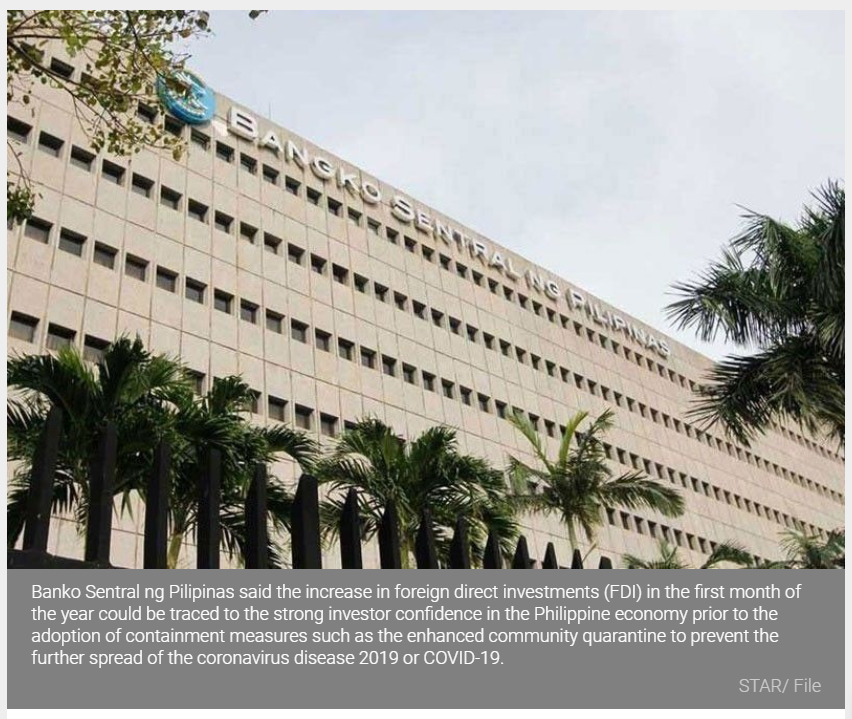Philippines: FDI up 12% in January
MANILA, Philippines — The Philippines booked a 12.1 percent hike in net inflow of long-term investments to $657 million in January from $586 million in the same month last year prior to the full-blown global coronavirus outbreak, according to the Bangko Sentral ng Pilipinas (BSP).
The central bank said the increase in foreign direct investments (FDI) in the first month of the year could be traced to the strong investor confidence in the Philippine economy prior to the adoption of containment measures such as the enhanced community quarantine to prevent the further spread of the coronavirus disease 2019 or COVID-19.
“This development, which was before the imposition of the community quarantine in the country due to COVID-19, reflects continued investor confidence in the Philippine economy, despite global economic uncertainties,” BSP said.
However, a drop in foreign investments is expected in the succeeding months due to the virus outbreak that has created massive uncertainty in global capital flows.
In fact, the United Nations Conference on Trade and Development (UNCTAD) sees global FDI flows plunging between 30 to 40 percent instead of growing by five to 15 percent this year as foreign investors continue to navigate uncharted waters.
Data released by the BSP showed equity infusions doubled to $373 million in January from $186 million in the same month last year, while withdrawals plunged by 90.7 percent to $21 million from $229 million.
The BSP said equity capital placements mainly came from the Netherlands and Singapore that were channeled to the manufacturing and real estate sectors.
On the other hand, reinvestment of earnings slipped by 5.1 percent to $72 million from $76 million, while non-residents’ investments in debt instruments consisting mainly of loans extended by parent companies abroad to their local affiliates fell by 57.9 percent to $233 million from $553 million.
Net FDI inflow dropped 23.1 percent to $7.65 billion last year from $9.95 billion in 2018 as global uncertainties as well as the delayed passage of the second tranche of the government’s tax reform program dampened investor sentiment, notwithstanding the country’s sound macroeconomic fundamentals.
Based on its assessment last December, the central bank’s Monetary Board said it sees net FDI inflow hitting $8.8 billion this year.
The Philippines booked an unprecedented $30 billion net FDI inflows over the past three years with $10.3 billion in 2017, $9.8 billion in 2018 and $9.95 billion in 2019. Inflows have been rising from $1.1 billion in 2010, $2 billion in 2011, $3.2 billion in 2012, $3.7 billion in 2013, $5.7 billion in 2014 before easing slightly to $5.6 billion in 2015 and recovering to $8.3 billion in 2016.
Michael Ricafort, chief economist at Rizal Commercial Banking Corp., said the pick up in investments at the start of the year was due to the improved global investment appetite after the Phase One deal between the US and China, lower local and global interest rates as well as the higher infrastructure spending toward the end of 2019 and early 2020.
Ricafort said the recent tensions between Washington and Beijing as well as the impact of the COVID-19 pandemic could still lead to greater hedging of FDIs and global chains toward Southeast Asian countries including the Philippines.
“The improved economic and credit fundamentals of the Philippines in recent years, amid attractive demographics, would make the country a compelling investment destination and additional hedge for the global supply chain or various multinational companies looking for increased sales,” Ricafort said.
The chief economist of the Yuchengco-led bank said the Philippines is also an attractive production and marketing hub in the region as investors could make it as an entry point to other free trade agreement partner countries.
Ricafort said the enactment of the proposed Corporate Recovery and Tax Incentives for Enterprises Act or CREATE bill (formerly Corporate Income Tax and Incentives Reform Act) aimed at slashing corporate income tax rate to 25 percent from 30 percent would help attract FDIs.
BSP Governor Benjamin Diokno said earlier the country could benefit from disruption to global supply chains as the coronavirus pandemic and the US-China trade war prompt countries to redirect trade and relocate production.
Due to the ongoing health crisis and the eruption of Taal Volcano in January, economic managers see the country’s gross domestic product contracting for the first time in more than two decades by two to 3.4 percent this year, then bouncing back with a growth of 7.1 to 8.1 percent next year.
Source: https://www.philstar.com/business/2020/05/28/2016948/fdi-12-january


 English
English




